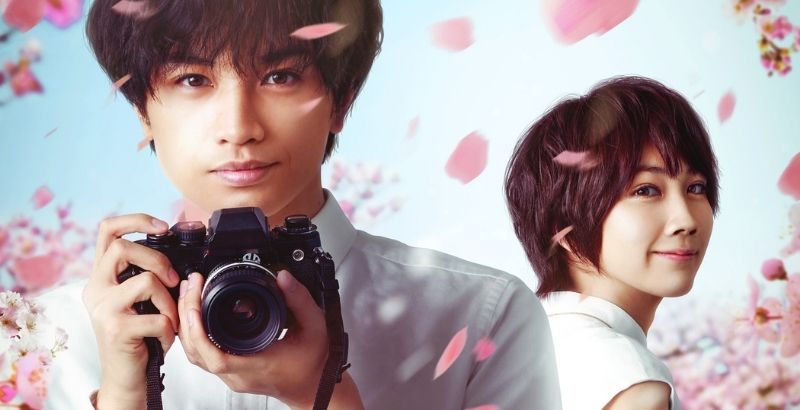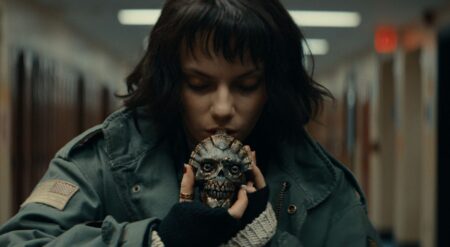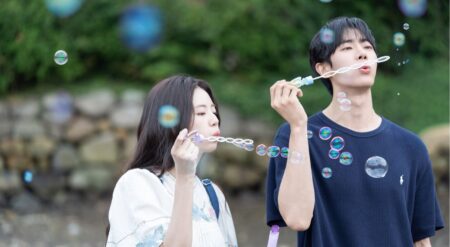
The Netflix Original Love Like the Falling Petals offers up a sweet romance with sadness that follows close behind. The romance is directed by Yoshihiro Fukagawa and is written for the screen by Tomoko Yoshida, based on the novel of the same name by Keisuke Uyama.
Love Like the Falling Petals stars Kento Nakajima and Honoka Matsumoto as Haruto and Misaki, a couple of 20-something who fall in love only for that love to be as short-lived as the cherry blossoms. Haruto is an aspiring photographer, but his shy attitude and avoidant behavior have him in a rut. The one thing that really brings him joy are his monthly haircuts from the bubbly Misaki. But, when Haruto finally works up the courage to ask Misaki out, she cuts his ear. A meet-cute that leads to a hospital visit quickly becomes a romance that blossoms quickly and seems to be happily ever after.
After three months of dating, long nights out, and a lot of happiness, Haruto is ready to take the next step and so is Misaki, until she starts to age, extremely quickly. Caused by a rare genetic disease, Misaki pushes Haruto away until it takes her life. And while that may sound like a spoiler, it isn’t because from the outset it’s clear that Misaki won’t survive it. Instead, Love Like the Falling Petals is about the time in-between. How the two live and how they can’t seem to break their love, even with the distance.
Starcrossed love can be endearing and emotional when done correctly. Unfortunately, Love Like the Falling Petals isn’t the examination of life and love it sets out to be. The film’s first act is an incredibly strong, if straightforward romance. However, at just over two hours, the first act’s sweetness doesn’t help the convoluted last two acts. While the first act has a clear vision, the last two aim to show hope in tragedy and the delicate state of love and life but instead waver between what emotions it wants to evoke.
Love Like the Falling Petals has a core that is good, but instead of focusing on the characters as they grow in relation to each other or on their own, we get a large section of the film that focuses on Misaki and her brother. More specifically how her brother tries and fails to cure her disease. While you wouldn’t expect her brother to give up, however, the way this plot point is executed all but robs Misaki of her agency and her choice.
Additionally, the absolute lack of communication and Misaki’s refusal to allow Haruto to see her even after he learns of her illness flattens the character into one that only cares about appearances. How can she love a man so much and yet, resign herself to the fact that he won’t ever see her again because she doesn’t want him to see her aged? While the film wants you to buy how deeply the love runs, it only seems to run one way, with Haruto desperate to see Misaki at least one last time, and her abject refusal to allow it.
But Love Like the Falling Petals isn’t all bad. While Misaki’s growth as a character is stunted with vanity and her brother’s pride, Haruto is allowed space to grow as a character and find himself, at least in the time between the break-up and learning the truth behind it. It’s his devotion to Misaki and how he begins to change his life that keeps the film’s romance burning. Not to mention, the film’s first act is so wonderfully directed and written that it had me sticking around, even when I grew frustrated, hoping to get back to it.
While there are some clear emotional moments in Love Like the Falling Petals, the dull nature of its commentary and the stunting of Misaki make it hard to view as a successful love story. Personally, I enjoy star-crossed lovers and doomed romance, but to execute those tropes, there needs to be investment from both characters in each other to connect the audience to them. Here, there is an emptiness that I just couldn’t shake while watching.
Love Like the Falling Petals is streaming now exclusively on Netflix.
Love Like the Falling Petals
-
Rating - 5/105/10
TL;DR
While there are some clear emotional moments in Love Like the Falling Petals, the dull nature of its commentary and the stunting of Misaki make it hard to view as a successful love story. Personally, I enjoy star-crossed lovers and doomed romance, but to execute those tropes, there needs to be investment from both characters in each other to connect the audience to them. Here, there is an emptiness that I just couldn’t shake while watching.






